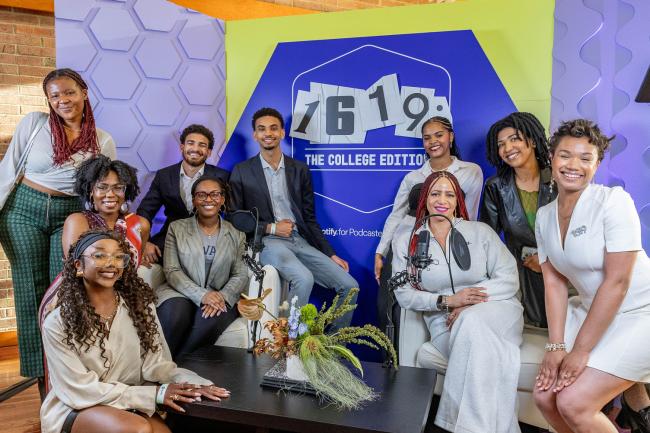By Amber D. Dodd
Podcast producer Spotify and Pulitzer prize-winning journalist Nikole Hannah-Jones debuted their “1619: The College Edition” podcast to a full crowd at Howard University on Wednesday, April 17. The podcast features episodes produced, edited and hosted by 19 journalism students.
The three-episode series is derived from Hannah-Jones’ Pulitzer Prize-winning project, “The 1619 Project.”
Hannah-Jones, who is a professor in the Howard University Cathy M. Hughes School of Communications and founder of The Center for Journalism and Democracy, guided her students in transforming The 1619 Project’s findings into a journalism-based curriculum. Each episode originates from essays written by students chosen for the podcast cohort.
“This is such a big moment for my students,” Hannah-Jones said.
“All the students have to write their own 1619 essay on whatever subject they wanted to write, then one day I get an email…from Spotify. The first thing I thought was ‘I would love to turn my students’ essays into a podcast that I could just hear.”
The partnership is part of Spotify’s NextGen program that “infuses, activates, and grows podcast culture on college campuses” with resources provided by the Spotify Creator Equity Fund.
“At a school like Howard, brilliance and talent live here like no other,” said Kristin Jerrett, Spotify’s equity, diversity, and impact and creator (DEIB) equity lead. “This exists in these students in a way that I have never seen through their writing and creativity.”
With “The 1619 Project” as a framework, the student-led podcasts bring funny, fresh, and bright perspectives that invite young listeners to understand Hannah-Jones original topics from a collegiate-level lens.
Student Panelist Discuss Their Podcasts
During the event, Hannah-Jones conducted a panel discussion with three students part of each episode: junior Jacob Smith, a film and television major; junior Trinity Webster-Bass, a broadcast journalism student; and Zoe Cummings, a sophomore journalism student.
The podcast’s first episode, “Principles of Drip” by Cummings, discusses how the Black fashion trends of today originated in African culture before slave trade was established, specifically the Ashanti Tribe’s tradition of being draped in gold regardless of social hierarchy. The episode tackles how those traditions, and Jim Crow’s strict dress code laws during the Reconstruction Era, sport strong ties to Black culture’s affinity for fashion today.
“Color Theory” by Smith, the second episode, discusses “racism’s ugly and pervasive child, colorism,” and its history as a divisive agent of white supremacy. Finally, “Queen Seminar” by Webster-Bass centers around the murder of gay dancer O’Shae Sibley at a New York City gas station, showcasing the range of lives, emotions, and experiences of the Black queer community.

